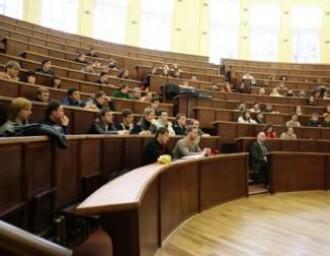Uladzimir Dunaeu: Students should recognize their interests and become consolidated

Belarus still has no visible background for outburst of students’ indignation. However, in the majority of cases such events happen accidentally.
Such tendencies in the talk with the EuroBelarus Information Service noted the member of the Public Bologna Committee Uladzimir Dunaeu.
Recently the Minister of Education of Belarus Siarhei Maskevich told that the tuition fees in universities will increase by 8-10 per cent. However, no wave of indignation came from the university students.
“First of all, our student community is not that organized, - recalled Uladzimir Dunaeu. - It lacks consolidation, clear understanding of its own interests and of how to maintain their rights. Besides, students are afraid of any actions that are of a political character or can be interpreted as such”.
One more side of the problem is the insufficient funding of the system of education on the whole, assumes the expert. “It is evident that Belarusan education gets shockingly low financing. And the attempt to put this burden on the shoulders of the students’ parents is somewhat motivated. Because if the state doesn’t provide enough money for the normal functioning of education, then one should look for some other sources of funding”, - explained the representative of the Public Bologna Committee.
He made an assumption that the current increase in the cost of education isn’t too heavy to lift for the population. “Obviously, it’s not the barrier that threatens parents’ budget”, - noted Uladzimir Dunaeu.
But what about the traditional idea that students are the most rebellious part of the population?
“It is true in the majority of cases, - the expert agreed. – But it usually happens all of sudden, and often it is hard to say what is the catalyzer of such rebel moods”.
The most vivid example of such student protests are the events of May 1968 in Paris provoked by the closure of the cinematheque, which “doesn’t look like threat neither to the budget, nor to the political rights”, - noted Uladzimir Dunaeu, adding that the outburst of students’ indignation can happen in the authoritarian societies, too.
“But it is very hard to expect that this is going to happen in Belarus, - he continued. – We don’t have any strong organizations of students, which shouldn’t necessarily have protest agenda, but are just associations of students”.
As the expert assumes, students should realize their interests and consolidate first, “even without attaching any political sense to their actions”. “And only then that we can start any organized actions to protect our interests”, - said the member of the Public Bologna Committee.
Therewith, we cannot say that the authorities managed to get the situation in the student community under their control. “This well-being seems to be illusory”, - Uladzimir Dunaeu shared his view.
“At some point there can appear an illusion that the authorities control processes within the student community, and that their youth policy is effective, - continued the interlocutor. – However, being built according to the Communist Party of the Soviet Union (CPSU) model, it is very archaic: its goal is to indoctrinate students’ minds, not to give them opportunity to make independent decisions”.
But at a certain point it becomes evident that the state policy is collapsing. Uladzimir Dunaeu recalled how Aliaksandr Lukashenka reacted to the events of December 19, 2010. “He understood that it was the youth that came at the Square. And after that ideologists who submitted another five-year youth program to the President were told off and it was said that they basically messed up everything ”, - recalled the expert. “So we shouldn’t be so confident about this sphere, as the state really controls the students”, - he believes.
-
03.01
-
07.10
-
22.09
-
17.08
-
12.08
-
30.09



























